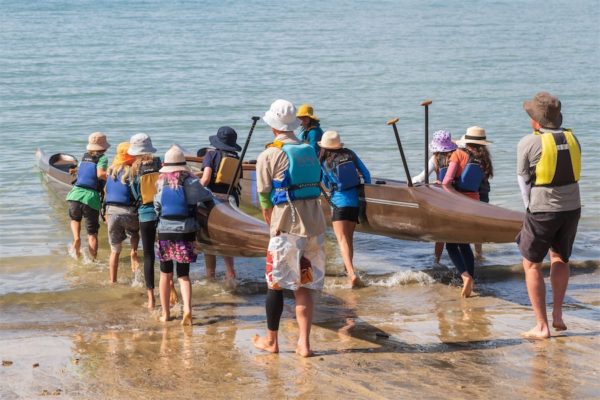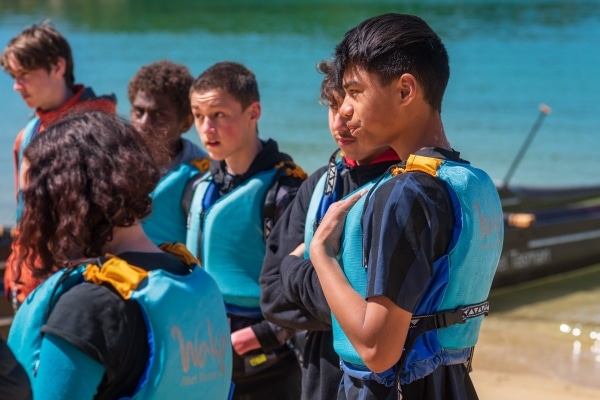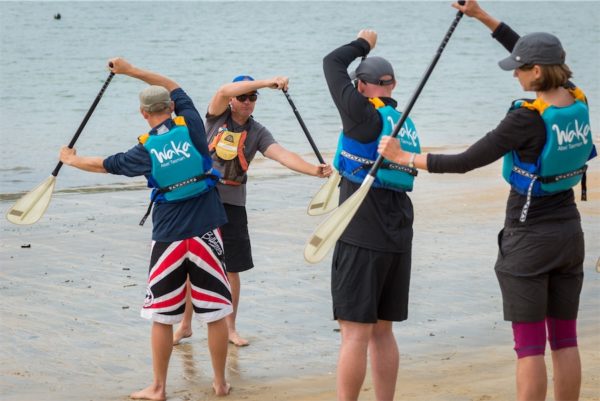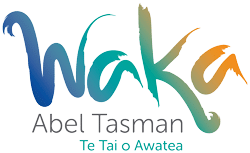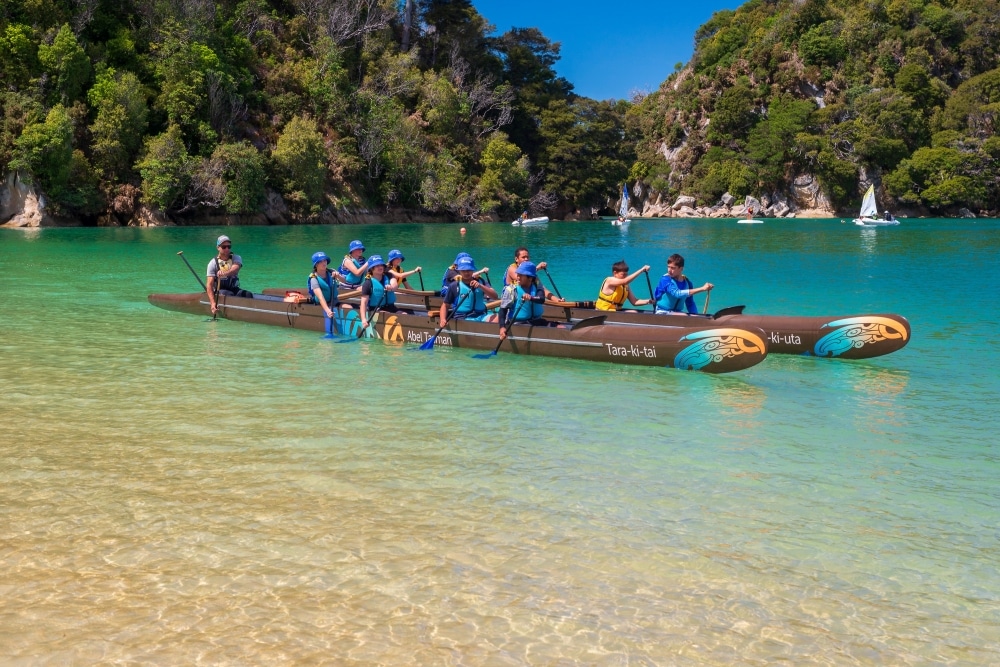
School Groups
Outdoor education experiences that fit the curriculum
An interactive, fun, cultural experience awaits.
Waka experiences for school kids of all ages
He Kupu Whakataki
Why waka and why us?
We look forward to extending manaakitanga (hospitality) to your group, and guiding your students in the wonders of the takutai moana (marine environment) and through the awesome educational experience that awaits them.
Want to book your school class or group?
This is not just physical activity but a time to experience Te Aō Maori, teamwork, history, geology, music and biology. The instructors take us on a journey of discovery, uncovering history of our local area, use of natural materials that can be used to create a vast variety of items from tools to musical instruments, learning Te Reo, have a go at blowing a Pūtātara (conch shell), participating in on board haka and come back feeling as one team, refreshed after an amazing experience on the water.
We will be continuing to have our children experience this activity as it is so much more than just conquering a physical challenge."
He Waka Eke Noa - Inclusion
(We are all in the canoe without exception)
He Hōtaka Ahurei
Tailored Programmes
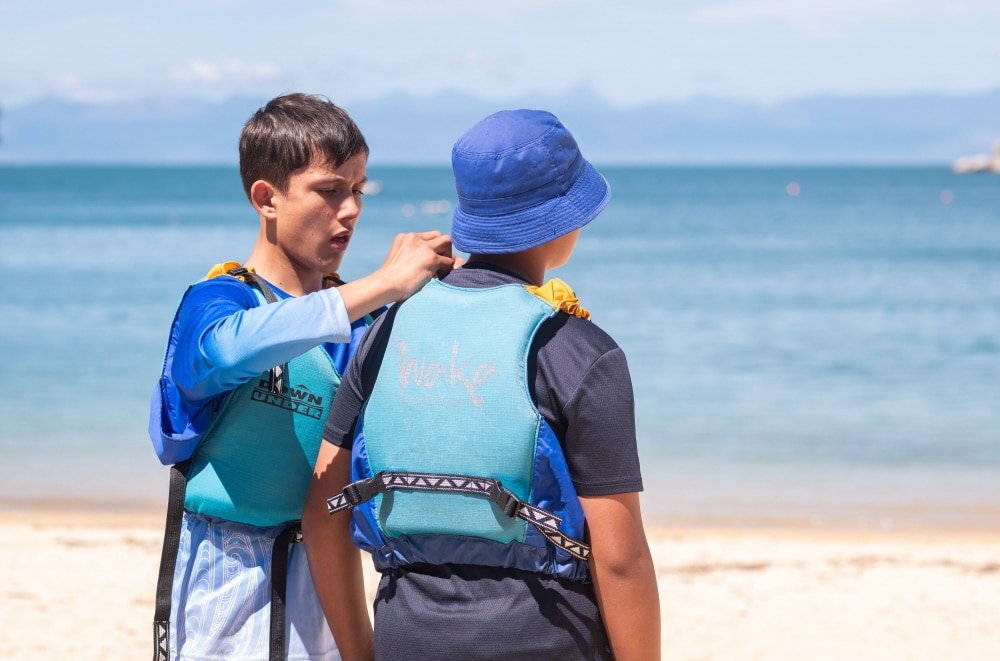
Years 1-4
Years 5-8
High school
Unit Standards
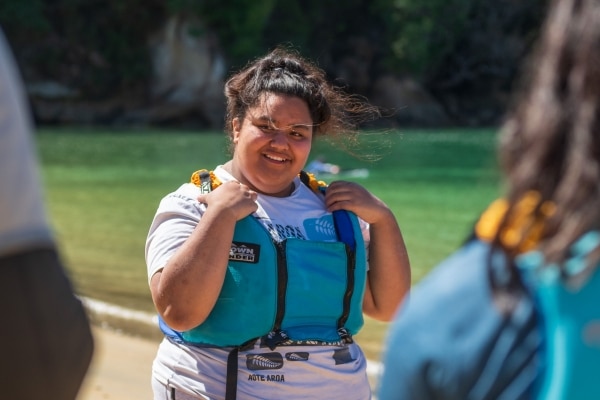
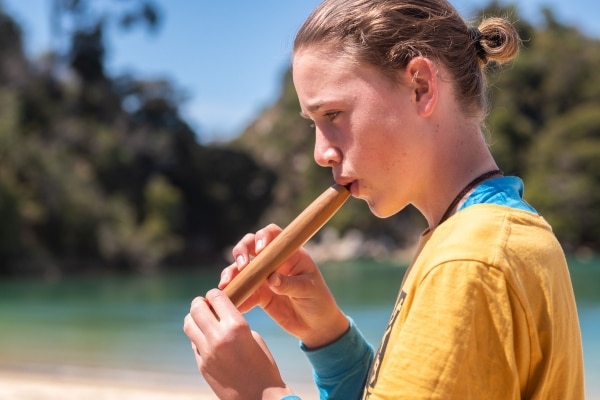
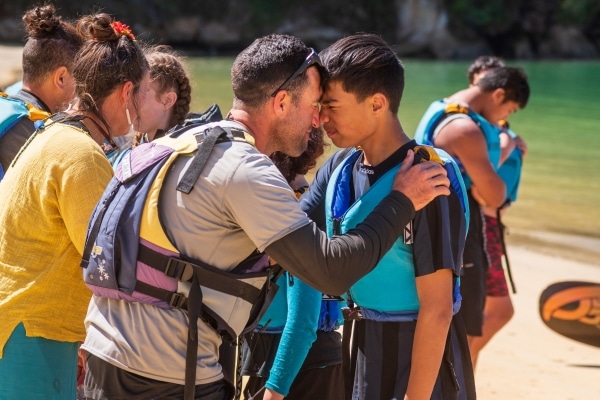
He Āhuatanga Ahurea
Cultural Aspects
Kōtahitanga and aroha
Using te reo Māori, Māori customs and protocols
During your time with us, students will engage in Māori customs and protocols, beginning with a whakatau (simple welcome ceremony) on the beach. Students will learn why these traditional cultural practices are important for us to maintain today. Local Māori history and heritage will be shared as well as information and understandings about particular atua (traditional deities) of the sea and land.
Tikanga waka
Our time on the sea, in the domain of Hine-Moana and Tangaroa (marine deities) will include at intervals, the sharing of historical information and stories related to the area. Additionally, paddlers will learn experientially about the multi-facetted challenges and achievements of paddling as a member of a waka team. Karakia at the end of the paddle signals gratitude for a safe return.
Poroporoaki (exchange of farewells)
(1) NZ Curriculum, Te Reo Māori: https://tereomaori.tki.org.nz/Curriculum-guidelines/The-importance-of-learning-te-reo-Maori/Changing-perceptions-over-time
Want to book your school class or group?
He Akoranga Ahutia
Fostered Learning
- An appreciation for the collective strength that is harnessed when we support each other; this is felt when we are paddling together.
- A willingness to integrate bicultural aspects into our daily lives, including being receptive to Māori world view and participating respectfully in cultural ceremonies.
An awareness of Māori history pertaining to the area and of the natural resources that sustained traditional ways of life here.
- A respect for the sea and marine ecosystem, and an instilled sense of kaitiakitanga; a responsibility to look after the natural environment for future generations.
- A desire to develop our own resilience individually and collectively, through working on our weaknesses and sharing our strengths.
He Painga Ākonga
Student Benefits
Tamariki will feel safe and uplifted, whilst being challenged to:
- Deepen their connection to the moana and to the local coastal area.
- Develop a sense of ease with experiencing aspects of Te Ao Māori (Māori world view)
- Feel proud and uplifted to be Māori and/or New Zealanders with an appreciation of our indigenous cultural and rich local heritage.
- Muster grit, determination and perseverance for the sake of group success.
He Hononga Ako
Links to Learning
Key Competencies, with intended educational outcomes through the waka experience, include:
- Thinking
Participants will be encouraged to reflect on their own learning throughout the session, and challenge the basis of prior assumptions and perceptions. - Using language & symbols
Competent communication on the waka is integral to successfully working in unison. Students will learn and use basic sea-voyaging terminology and language, and introduced to the interpretation of traditional Māori movements, metaphors, environmental cues and traditional technologies used to convey meaning. - Managing self
Participants are assigned roles on board the waka that will require them to manage themselves, monitor their own performance and muster resilience when challenged. There are also opportunities for leadership. Students will learn when to lead, when to follow, and when to act independently. - Relating to others
Participants will come to appreciate the art of collaborative effort as a double-hulled canoe cannot be powered by one person alone. Students will learn that team work and co-operation requires positive encouragement of each other, working effectively together, to get the best collective result. - Participating and contributing
Capacity to contribute as a group member is very much valued onboard. From pace setting to calling change-overs, waka participants see instantly the relevance of their role and contribution with every paddle stroke. In the context of waka, students will learn the importance of balancing rights, roles and responsibilities (2).
(2) Adapted from NZ Curriculum, Key Competencies: https://nzcurriculum.tki.org.nz/Key-competencies
He Tīaroaro Mātāpono
Aligning Principles
The Waka Abel Tasman educational experience aligns with all principles of the NZ Curriculum:
- High Expectations
by supporting and empowering students to learn and achieve personal excellence, regardless of their individual circumstances. - Cultural Diversity
by reflecting New Zealand’s cultural diversity and valuing the histories and traditions of Tāngata Whenua. - Inclusion
by ensuring that students’ identities, languages, abilities, and talents are recognised and affirmed and that their learning needs to achieve success through the waka experience are addressed. - Coherence
by offering students an educational experience that makes links within and across learning areas, provides for coherent transitions, and opens up pathways to further learning. - Future Focus
by encouraging students to look to the future by exploring such significant future focused issues as sustainability, citizenship, enterprise and globalization. - Treaty of Waitangi
by acknowledging the principles of the Treaty of Waitangi and the bicultural foundations of Aotearoa New Zealand. Students have the opportunity to acquire knowledge of Te Reo Māori me ōna Tikanga during their waka experience. - Community Engagement
by providing students with a meaningful learning experience that connects with their wider lives, and engages the support of their families, whānau, and communities. - Learning to Learn
by encouraging students to reflect on their own learning processes and challenging them with a new context in which to explore how to learn. (3)
(3) Adapted from NZ Curriculum, Principles: https://nzcurriculum.tki.org.nz/Principles
He Hikinga Uara
Upholding Values
The Waka Abel Tasman educational experience upholds the core values of the NZ Curriculum, encouraging students to value:
- Excellence by aiming high and by persevering in the face of difficulties;
- Innovation, inquiry, and curiosity, by thinking critically, creatively, and reflectively;
- Diversity as found in our different cultures, languages, and heritages;
- Equity through fairness and social justice;
- Community and participation for the common good;
- Ecological sustainability, which includes care for the environment;
- Integrity, which involves being honest, responsible, and accountable and acting ethically; and to respect themselves, others, and human rights (4).
(4) NZ Curriculum, Values: https://nzcurriculum.tki.org.nz/The-New-Zealand-Curriculum#collapsible6
He Hononga Marautanga
Curriculum Links
Health & Physical Education
- Hauora – a Māori philosophy of well-being that includes the dimensions taha wairua, taha hinengaro, taha tinana, and taha whānau, each one influencing and supporting the others.
- Attitudes and values – a positive, responsible attitude on the part of students to their own well-being; respect, care, and concern for other people and the environment; and a sense of social justice.
- The socio-ecological perspective – a way of viewing and understanding the interrelationships that exist between the individual, others, and society.
- Health promotion – a process that helps to develop and maintain supportive physical and emotional environments and that involves students in personal and collective action. (5)
(5) NZ Curriculum, Health and Physical Education: https://nzcurriculum.tki.org.nz/The-New-Zealand-Curriculum/Health-and-physical-education
Social Studies
- Identity, Culture, and Organisation – Students learn about society and communities and how they function. They also learn about the diverse cultures and identities of people within those communities and about the effects of these on the participation of groups and individuals.
- Place and Environment – Students learn about how people perceive, represent, interpret, and interact with places and environments. They come to understand the relationships that exist between people and the environment.
- Continuity and Change – Students learn about past events, experiences, and actions and the changing ways in which these have been interpreted over time. This helps them to understand the past and the present and to imagine possible futures.
- The Economic World – Students learn about the ways in which people participate in economic activities and about the consumption, production, and distribution of goods and services. They develop an understanding of their role in the economy and of how economic decisions affect individuals and communities. (6)
(6) NZ Curriculum, Social Sciences: https://nzcurriculum.tki.org.nz/The-New-Zealand-Curriculum/Social-sciences/Learning-area-structure
He Pātai
Common Questions
How many students can be catered for at one time?
The maximum number at one time that we can take in each group is 44 and the minimum is four. We can do as many rotations as necessary, so larger numbers are no problem.
When are Waka Abel Tasman trips offered for school groups?
Bookings are available throughout the year, Monday to Friday, from 9.30 am. When making a booking, select a preferred date and a secondary option in case of unavailability. Please note that all online bookings are initially tentative and are subject to confirmation.
Who should be made known and/or identified to Waka Abel Tasman?
Those with medical conditions and/or students requiring an adapted waka experience should be made known to Waka Abel Tasman at the time of booking, or as soon as possible afterwards, to allow instructors time to consider and plan for any necessary modifications. Students requiring additional support to ensure student safety should also been identified to the instructors on the day.
What should participants wear and bring?
Comfortable leisurewear suitable to the activity and the weather conditions is the most appropriate type of clothing for this occasion. Participants should also bring a warm, windproof jacket, sunhat and water bottle. Emergency medications, such as Ventolin for asthma, should be carried by the individual requiring them if self-managing, or by an accompanying adult chaperone.
Why might a waka experience be postponed or cancelled?
All efforts will be made to check anticipated weather conditions well ahead of your scheduled session. If however expected extreme weather poses a threat to student safety on the sea, an alternative date, time or session programme may need to be coordinated in consultation with the contact teacher.
Where can school groups locate suitable nearby accommodation if required?
Schools can book to stay at Bethany Park, in Kaiteretere.
Alternatively, Marahau Outdoor Education Centre
Want to book your school class or group?
